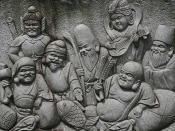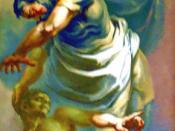THE LUST FOR POWER: HOW POLITICS AND PERSONAL RELATIONS BECOME ONE
The stories of the Bible reveal a pattern of "ups and downs" for the nation of Israel. A period of prosperity, faithfulness and fearing God would almost always be followed by a period of destitution, lawlessness and idolatry. This recurring cycle can be linked to political authority, and the level of separation of political authority from other influences. The successful struggle for liberation under the leadership of Moses and the glorious conquest of Canaan under Joshua instilled a fresh breeze of hope and a renewed faith in God in the nation of Israel. Guided by God, the nation of Israel met with unprecedented success as they journeyed to the promised land. During this time, political authority among the Israelites rested in the hands of patriarchs, or prominent members within the tribes. These men were righteous figures of authority, chosen by God, to lead His people and to teach His ways.
The success that swept over the Israelites was short-lived, however, and for the next two hundred years the people of Israel struggled against neighboring tribes. The new generation of Israelites "knew neither the Lord nor what he did for Israel"(Judges 2:10). They began to "do evil in the eyes of the Lord" by worshipping other gods and engaging in various sexual activities. To save His people from their enemies and from their "evil ways," God "raised up" judges to rescue them (Judges 2:16). These so-called judges had the political authority vested in them to lead the people of Israel and to save them from their sins. They mobilized the people of Israel against invasions of the tribes all around them. At this time, the nation of Israel was nothing more than a loose confederation of twelve tribes.


